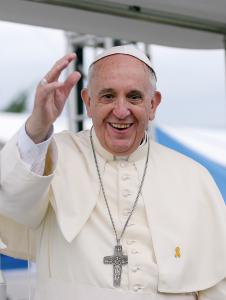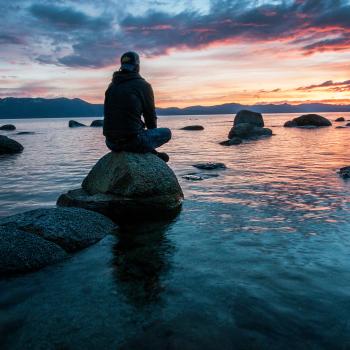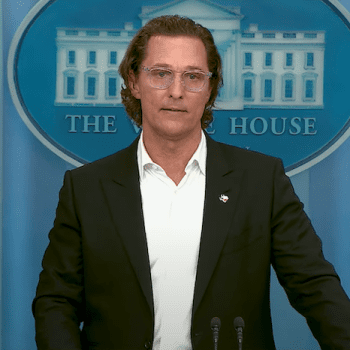 I had a different agenda altogether this month for an article concept (Part III of the Blade Runner series—coming soon), but as life often does, events conspired to force me to grapple with another issue deserving of reflection for this month’s article. Though I have pondered my own mortality in recent years, realizing that I am 51 and have more years behind me than ahead of me, I am not grappling with anywhere near the same universe of challenges that my parents are (both age 86). Recently, my father fell at home and broke a bone in his pelvis. The doctor at the hospital told him that there was really nothing they could do for it; it was like a broken rib that was just going to have to heal in time on its own. They released him to a local skilled nursing facility (ironically, the exact same facility where both of my grandmothers spent the last several years of their lives) where he could heal under constant surveillance and have daily access to the physical therapy he needs to get as well as an 86 year old man who has suffered this, a stroke, and some other health issues can get. I knew how this was going to go.
I had a different agenda altogether this month for an article concept (Part III of the Blade Runner series—coming soon), but as life often does, events conspired to force me to grapple with another issue deserving of reflection for this month’s article. Though I have pondered my own mortality in recent years, realizing that I am 51 and have more years behind me than ahead of me, I am not grappling with anywhere near the same universe of challenges that my parents are (both age 86). Recently, my father fell at home and broke a bone in his pelvis. The doctor at the hospital told him that there was really nothing they could do for it; it was like a broken rib that was just going to have to heal in time on its own. They released him to a local skilled nursing facility (ironically, the exact same facility where both of my grandmothers spent the last several years of their lives) where he could heal under constant surveillance and have daily access to the physical therapy he needs to get as well as an 86 year old man who has suffered this, a stroke, and some other health issues can get. I knew how this was going to go.
I deeply love my dad. I believe that he is a spiritual man, though definitely not a religious one. If I ever asked as a child why we did not go to church, I would first receive the response: “When I go outside, I am in church.” If I pushed him on it, he would take me on a Sunday to the local Presbyterian (I wonder why that one was the choice) church, and as we were walking out, he would say, “There. Do you feel holier now?” I learned to stop asking.
One quirky (or perhaps its more common than I know) thing about him is that he has never been one for doctors or hospitals. If there isn’t an immediate and desperate need, he won’t go. Forget something like a well-exam; that’s like an optional doctor’s visit. Who does that? No, he has no time for those who try to tell him how to live his life. He has always been one to do things his own way. So imagine such a powerful personality being required to spend time in a facility that not only carries painful memories for him of the difficult last years of his own mother’s life, but where he is also surrounded by (well-meaning) people who are telling him what to do, even if it is in his own best interests. Suffice it to say, he wasn’t happy in the least. It took the persuasive influences of my siblings who were able to be there at the time to convince him that no, he couldn’t just pack up and go home when he chose to. He would actually have to stay the course until those supervising him cleared him for release. Then came the news that the doctor would only release him to an assisted living facility—he wouldn’t be going home. Ever.
Wow. I was hundreds of miles from the room when that news was dropped on him, but I think I felt the emotional shock wave from clear across the state. My older brother was there to let him know, and from what I could tell from my sister’s account, though dad wasn’t happy, he knew deep down what the reality of the situation was, and that he was no longer the man he imagined himself to be. Mom could not look after him alone any longer. They needed help, and though he was not happy (who would be?), he accepted what had to be done.
My parents had lived in their home since I was in the third grade. It was my home until my graduation from college, and I would continue to return for visits as often as I was able, wandering through the rooms of the house and feeling the echoes of memories forged within its walls. I have been away from that house for much longer than I lived in it, but it has been my parents’ home for 43 years–half their lives. To some, the place where they live may not carry great emotional attachment; it is just four walls and roof to keep the rain out. To others, it is a shrine, a scrapbook holding ethereal echoes of the lives of the family that inhabit it. I wrote long ago, in my inaugural article for the society, of the power that a place and its landscape can have on one’s spirituality. When I left home, it was more the country surrounding it, the very landscape itself, that bound me. Our house of course held memories, but my parents had changed many of its furnishings over the years, and every time I would visit it was a little less of the place in which I grew up. That made it no less special to me, but I think it was my parents being there that made it so. Without them, the house, at least to me, will lose the last of its hold on my spirit. Memories are made rich by the people with whom we share them; where we make those memories plays a supporting role, but not the lead.
I cannot speak for how this move will affect my parents. They know it is necessary, that they can’t cling to a life phase that has run its course. They face a threshold that will be difficult to cross. It is my hope that they will see it as a new adventure, a chance for renewal and a fresh start. In the end, though, how they feel about it is not something I can control. Of course it will never be the same, but perhaps, with enough furniture, photos and mementos of home, they can preserve enough of its essence to ease the transition. I can but love and support them as they traverse this new path.
Both my wife and I have seen the changes age can bring upon those we love. Those changes aren’t all physical, though I suppose body changes do form the foundation of mental decline as well. It is difficult to see the people you remember as vibrant, confident pillars representing all you respect and value, those you depended upon for so long, fade to the point where they depend a great deal on you. We love, respect, and honor them no less, yet we must sometimes fight back the frustration with their forgetfulness and remember that they did not choose for these changes to happen. They do not wish to become burdens. They want to live, to continue as they have for so long. They don’t want to surrender their valued independence and face the reality that they can no longer do things for themselves that they took for granted for so many years. When just getting out of bed, bathing, and taking care of basic bodily functions become challenging, what can help us get through it? What helps us to move on? Of course the presence around us of those we love will help, but they have their own lives and responsibilities as well, and won’t be able to be there all the time. For me, should my destiny hold that I live that long and face those challenges, I will need a purpose.
I have devoted my life to helping young people find their own purposes, helping to direct them to career paths or futures that fit their aptitudes and desires. One day, that particular path for me will have run its course, and a new purpose will need to be found. It will have to be one that allows me to serve others in some capacity; I can’t imagine an existence where I am the center of my own world. I will need to give back somehow, for as long as I am able.
What happens then when the ability to do so fades, when physical and mental capacities degrade to the point where service to others becomes a virtual impossibility and all purpose seems stripped away? What then? Is it enough just to exist, perhaps to read or listen to music if sufficient eyesight and hearing remain to us? It is a frightening prospect, one that countless individuals wake up to every day. What motivates them? What gives them reason to face yet another day? Facing the end of our journey is a life threshold, just as coming of age and reaching mid-life were. Unless our lives are taken from us by disease, accident or some other external factor other than “old age,” we may all need to confront the slow descent my own parents are facing, and which some readers of this may even be facing now.
Perhaps tending a garden, even a single plant, can serve as a purpose. Perhaps lessening the pain and grief of those among us (should we be in a living situation surrounded by others who are facing similar challenges) in whatever small ways we can will serve; a smile, a word of encouragement, a hand on the shoulder. We may not be able to reach as many people as we could when we had the mental and physical vigor to make a greater difference, but while we live, finding meaning and purpose cannot be fully stripped away from us unless we choose not to seek it any longer. We want to live, not just wait to die.
This is all easy for me to say. I may yet have fifteen to twenty years of difference-making vigor left to me. I may have less—who can tell? I haven’t faced the challenges my parents now face, and cannot presume to speak, think, or feel for them. It pains me to see them having to suddenly be faced with such drastic, unwanted changes in their lives, left with few options after so many long and meaningful decades living the way they wished to. Whatever meaning or purpose they now find must be theirs and theirs alone. They have children, grandchildren, and great grandchildren who love them and will remain part of their lives, supporting them and helping them forge their new path. I trust that, once the initial transition (difficult as it will be) has run its course, that they will accept and find meaning in the new reality ahead.
Whatever other private consolations and philosophical practices they may have are unknown to me. They allowed me to find my own path (and what a winding path it has proven to be), and it is my hope that they can draw strength from whatever spiritual readings, maxims, rituals, or objects bind them together or speak to them as individuals. May my own love, one of the greatest spiritual forces known, be one of the lights that helps lead them through the current darkness. May all of you, either facing these challenges yourselves or caring for those who are, find the strength and sense of purpose you need to keep moving forward in your own adventures. Choose to live—and always seek a purpose.
I love you, mom and dad.















